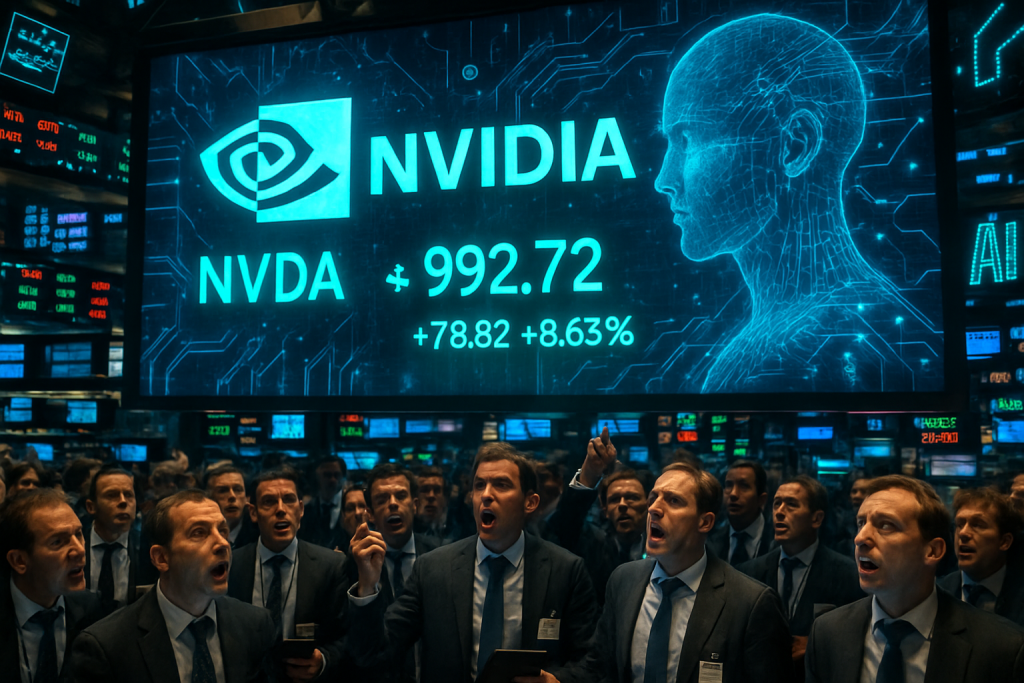The air crackled with anticipation. It wasn’t just another earnings call; it was August 22nd, 2025, and all eyes were glued to Nvidia. Forget the summer blockbusters or the latest season of “Silicon Valley Housewives”; this was the real drama, the kind that could send shockwaves through Wall Street and beyond. Nvidia, the undisputed king of AI silicon, was about to reveal its quarterly numbers, and the fate of the AI gold rush hung in the balance. Think of it like waiting to see if Neo could dodge those bullets in the Matrix, only this time, the bullets were market corrections and investor anxieties.
To understand the pressure cooker Nvidia found itself in, you have to rewind a bit. Since October 2022, Nvidia’s stock had been on a rocket ship, soaring over 1,400%. That’s not just good; that’s “Elon Musk tweeting about Dogecoin” good. They became synonymous with the AI revolution, their GPUs the pickaxes and shovels for the new digital gold miners. Remember how everyone suddenly needed GPUs to train their cat-identifying AI? That was Nvidia’s world, and we were all just living in it. This culminated in a historic moment in July 2025 when Nvidia breached the $4 trillion market cap, a feat previously only achieved by a select few titans of tech. They weren’t just a company; they were a symbol, a living, breathing testament to the power of artificial intelligence.
But even the most epic winning streaks eventually face a test. In the week leading up to the earnings report, the tech sector took a tumble, dropping around 3%. It was a collective shiver, a moment of doubt in the relentless AI narrative. Were valuations getting ahead of themselves? Was the AI hype train about to derail? Enter Nvidia, stage right, tasked with either restoring faith or confirming the market’s worst fears. Analysts were predicting a stellar 48% jump in earnings per share, with revenues projected to hit a staggering $45.9 billion. But numbers are just numbers. The real question was: could Nvidia deliver the magic?
The weight on Nvidia’s shoulders wasn’t just about their own performance. They had become a bellwether for the entire AI industry. As Matthew Maley, chief market strategist at Miller Tabak, put it, the impact of Nvidia’s earnings was magnified by the recent tech sector slump. Matt Orton, chief market strategist at Raymond James Investment Management, echoed this sentiment, stating that Nvidia’s performance was essentially a proxy for the broader AI trend. It was like that scene in “Avengers: Endgame” where all the heroes look to Captain America, waiting for him to say “Avengers, assemble!” Nvidia was Cap, and the market was waiting for their signal.
The potential ramifications were immense. A strong earnings report would be like a shot of adrenaline to the AI-driven market rally, reassuring investors that the hype was justified. But a miss? That could trigger a cascade of selling, sending tech stocks into a tailspin and forcing a painful reassessment of AI valuations. And with Nvidia holding a hefty 8% chunk of the S&P 500, the impact wouldn’t be limited to tech. It could drag down the entire market, impacting everything from pension funds to your grandma’s retirement savings.
Beyond the immediate financial implications, Nvidia’s performance also touched on deeper societal questions. The AI boom had already sparked debates about job displacement, algorithmic bias, and the potential for autonomous weapons. A slowdown in AI investment could ease some of those concerns, but it could also stifle innovation and delay the arrival of potentially life-changing technologies. Conversely, continued explosive growth in AI would only amplify these ethical dilemmas, forcing us to confront the tough questions about the future of humanity in an age of intelligent machines. Are we building a utopia or a dystopia, and is Nvidia holding the blueprints?
So, on August 22nd, 2025, the world held its breath. Nvidia’s earnings report wasn’t just about numbers; it was about the future. It was a referendum on AI, a test of faith in technology, and a glimpse into the world we were building. Whether Nvidia soared or stumbled, one thing was certain: the AI revolution was far from over, and its impact would continue to shape our lives in ways we could only begin to imagine.
Discover more from Just Buzz
Subscribe to get the latest posts sent to your email.


